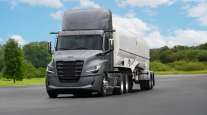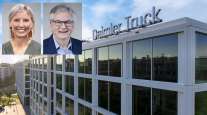New Daimler Trucks CEO on the Company's Future in Portland, Autonomous Vehicles

Less than a decade ago, Portland, Ore.-based Freightliner appeared to have one foot out the door. The storied maker of big rigs changed its name to Daimler Trucks North America, then announced it would move hundreds of headquarters jobs to North Carolina.
In 2013, it changed course and announced plans for a new, $150 million headquarters on Swan Island, Ore. And, more recently, it opened a new test track in Madras, Ore., moving that function from Indiana.
Another change occurred in the C-level suites, with the elevation of Roger Nielsen to chief executive. The longtime Oregonian, who'd been chief operating officer for 16 years, now splits his time between Portland and Charlotte, N.C.
He spoke with The Oregonian/OregonLive from an office terrace overlooking the Madras test track about Daimler's future in Oregon, autonomous trucks and company culture in light of several discrimination lawsuits. The interview has been edited for length and clarity.
Q: Daimler Trucks announced the Madras facility just months after opening its new Portland headquarters. Did those decisions come at the same time?
A: One came after the other. We were leasing space throughout North Portland and Northwest Portland. As congestion built up in Portland, you never knew when you had to leave to get to the other side of the river. At the same time, we decided we needed a modern workplace if we were going to become the employer of choice in Portland and in Oregon.
We also had distance between the engineers in Portland and the testing group in South Bend, Indiana. If we were going to bring products to market faster, the engineers and the testing group needed to be closer together. If something breaks on a truck in Indiana, it might be two, three, four weeks before you could get out to see it. Here, if something breaks, you're out the next morning to look at it.
RELATED: Daimler Trucks North America opens $18.7 million truck proving grounds
Q: You're a longtime Daimler Trucks employee. How did you get started?
A: I graduated from Oregon State in 1983, and I grew up in Portland. I went to high school in Troutdale, so I've known Freightliner forever. Parents of my friends worked there.
When I graduated, I took a job in Los Angeles. I worked for a company that was building laser rangefinders for M-1 tanks and missile guidance systems — things you couldn't talk about with your friends, and if you did, they wouldn't know what you were talking about. After three years, I decided L.A. wasn't a place to raise a family. I'd married in the meantime. I missed Oregon. Freightliner gave me an opportunity to start, so I took a pay cut and moved to Portland.
I started off as the lowest-level engineer. ... Over the years, I got great opportunities to start up new factories, and help buy and sell subsidiaries. I was able to grow up in the company.
Q: In 2007, Daimler Trucks started moving employees — including you — to Charlotte. There was a sense in Portland that Daimler was on the way out. What happened?
A: There was an initiative to relocate some headquarter functions to Charlotte, and that initiative had a very short life. We decided against finishing it in 2009, though we had already moved about 500 jobs.
It came at a time when a lot of the economy was still doing well, before the fall of Lehman Brothers. (The financial services company filed for bankruptcy in September 2008, setting off the global financial crisis.) Afterward, our market dropped out from under us. We fell from a peak of making 800 trucks a day to a low of 120.
With such a massive change in our business, it wasn't the time to continue relocating employees. ... We had to decide whether we were going to move to Charlotte or not, and we chose in 2009 to say OK, we're not.
Q: Even after that, there was still a sense that Daimler wasn't long for Portland.
A: We're committed to Portland. We're committed to becoming the employer of choice in Portland. We're committed to the long-term future of the company based here in Portland, Ore.
Q: What about the future of manufacturing on Swan Island?
A: The Portland plant has been assembling trucks since 1947. Great workforce. Today, we're working on nearly one full shift. For the foreseeable future, that's how we'll run it.
Q: In 2015, Daimler debuted a self-driving truck in a flashy unveiling atop the Hoover Dam. Where is that technology heading?
A: We do not see a point in the near future where there will be driverless trucks on the road. But the technology that will be needed for fully autonomous trucks is the technology needed for today's trucks — everything from active braking to lane control to active cruise control to driver attentiveness monitoring.
I look at it like NASA — a lot of their inventions worked their way into daily life. It's the same thing here.
Q: Daimler Trucks has been the target of racial and age discrimination lawsuits from employees in both the engineering division and in manufacturing. Does that reflect the culture of the company?
A: The legal process went through, and we respect the results of that legal process. But absolutely, the allegations do not reflect the culture of our company, and we don't recognize it. What plaintiffs were saying in those isolated cases did not reflect our experience, my experience, in this company.
Culture is always evolving. You can never stop and say, "This is the culture I want from now on." There's always room for continuing improvement and there's always room for more empathy. We'll learn and go on.
Distributed by Tribune Content Agency, LLC




